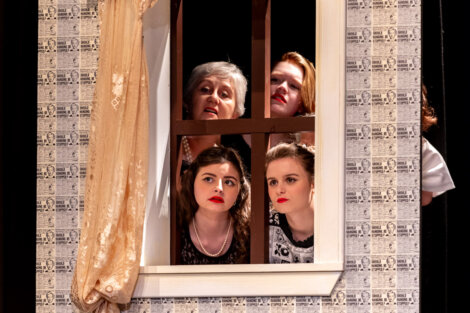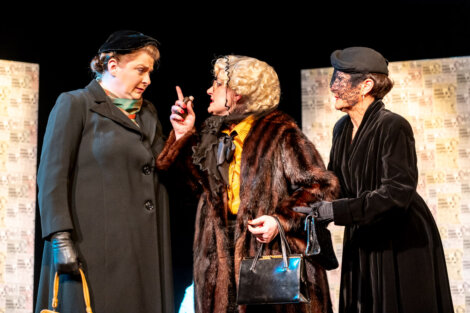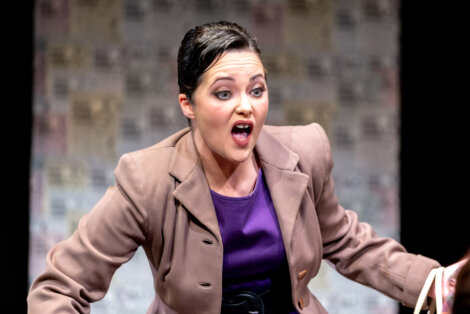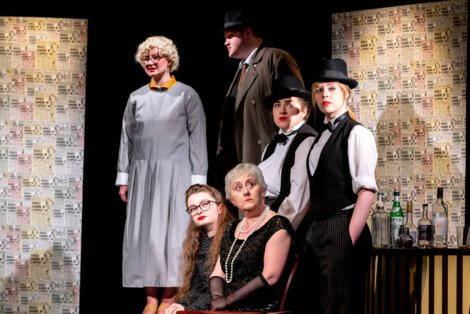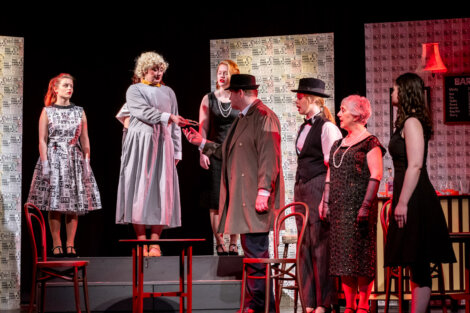Reviews / The power of story telling
THE WORLD is full of stories. History is jam-packed with tales – shocking anecdotes, quirky episodes and humorous yarns, writes Helen Kerr.
So many of them go untold – maybe sometimes we don’t realise they are even interesting enough to tell. Not so for Ruth Ellis. Islesburgh Drama Group’s recent production of Amanda Whittington’s The Thrill of Love once more reiterates the power – and necessity – of telling stories.
I, for one, had not heard of Ruth Ellis before this play. There are many reasons why Ellis’ story might have been a mundane tale – that of a London working girl in the 40s – had it not been for a fraught love life at the hands of an abusive man.
Ellis was a model and night club owner; she had acted in a small role in a film, but other than that was likely similar to many other women of her time. The fact that we can call her ‘the last woman to be hanged in the UK’ adds some startling reality, however, to what might have been a life a lot like any other.
Stephenie Georgia’s direction of The Thrill of Love resulted in an outstanding piece of theatre. Once more nestled into The Garrison, an expectant crowd was not disappointed.
Donna-Marie Leask’s tender portrayal of Ruth Ellis was superb. At once, we were drawn into a character with charm, humour and levity. Ellis seemed both likeable and relatable; a woman not afraid of grafting – dreaming of a better tomorrow… I have always said Leask is a powerhouse of a performer, and this play was no exception.
Become a supporter of Shetland News
The cast was relatively small. Three other female characters and the Inspector Gooleesque presence of detective Jack Gale, gently and sensitively played by Barnum Smith, allowed us to settle in and get to know them all well.
Morag Mouat simply shone as the manager – Sylvia Shaw – of the establishment Ellis was working at. Again, a woman we can imagine knowing: a stern matriarch who, underneath, was compassionate and warm. Mouat brought plenty of well-timed laughs to the narrative – a clever little device that lured us away momentarily from the severity of the subject matter.
Lynsey Rendall’s homely presentation of the straight-laced Doris Judd offered a different dimension; one of the play’s strengths was showing the many glorious ways women can be different and yet united. Distinct and yet unwaveringly loyal to each other. Rendall’s softness contrasted with the harsher lives of Ellis and Shaw, yet by the end of the play we saw she had been let down just as much as the other women were.
The show was, however, quite possibly stolen by Nicola Fleck who played the young, impressionable Vickie Martin. Boisterous, loud, comical and full of dreams, Martin gave us a snapshot into what the lives of Ellis and Shaw were probably once like. Young girls, with big plans of fame and fortune. Fleck’s onstage presence is entirely captivating – from her well-sustained Cockney accent to her extravagant personality, she transported this little small-town community theatre out of amateur dramatics. For a few short hours, you could forget where you were as you became fully absorbed into the lives and tales of these women.
Set almost entirely in the living quarters of Shaw and Ellis, there was little movement on the stage by way of scene changes. An ensemble group, dressed in society outfits of the time, slid in and out of the set to move pieces of furniture.
This decision to not darken the stage entirely to make changes was a fascinating way of revealing a number of other facets to the story – Ellis lived among socialites, people who came in and out of the establishments she worked in. Most of them would not have known or noticed her, and the ensemble cast served as reminder of the fact that all our lives are so intricately woven with so many encounters with others. Some we’ll know and remember, some we won’t.
The set design was reasonably simple: a bar to imply the public life of Ellis et al, and a chaise longue to signify the private. Between them both was a series of bar tables and seats that demonstrated the devastating connection between the life Ellis lived publicly and the life she seemed to long for privately. The wallpaper adorning the walls looked to be a repetitive, square pattern, typical of the era.
In fact it was Ellis’ face on the front of a tabloid newspaper asking the question: Should the hanging be stopped? A nod to the era, sure, but more than that: an uncomfortable acknowledgment of the inevitability of Ellis’ demise.
This wasn’t the only clever use of design, however. The lights periodically dimmed to a deep red, both unnerving and ominous at the same time. We felt the sordidness and the alarm, the chaos and the deception in these moments.
Another key touch was the intermittent crack of what was either gunfire or a camera flash. We were never sure which it was supposed to be. We were sitting there with the clear knowledge that Ellis had shot a man, and yet we also saw her – and Martin’s – desire for a life of fame and notoriety. That it was both at the same time only underscored the terrible sadness of what was to come.
As I said before, Ellis was the last woman hanged in the UK. There was no cheerful or optimistic ending at the conclusion of this play. We did not see corners turned, or the proverbial light at the end of the tunnel flood the theatre.
Ellis was hanged for her crime, Vickie Martin died, Doris Judd was abandoned and Sylvia Shaw only edged more into a resigned bitterness. Come on, Islesburgh Drama Group! Where is the hope?
The hope might not always be in the story, but maybe it’s in the telling. Georgia’s direction of The Thrill of Love bundled us up close and personal with lives we might not have otherwise known. But also lives we might know something of.
There have been attempts since Ellis’ death to clear her of the crime of murder, given the nature of what she suffered at the hands of the man she killed. These have not been met with the success they sought to achieve. However, Ellis’ story has started other conversations – about capital punishment, about abusive behaviours and about humanity.
Theatre is a master storyteller. Long may it continue to be so.


































